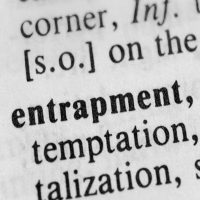Does The Entrapment Defense Really Work?

To be acquitted of a crime, you do not always have to prove that you didn’t do it. In fact, you never have to prove this. All you have to do is show that the jury cannot be sure whether you committed the crime. Of course, even when there is little room for doubt about whether the accusations are true, you can also be acquitted, have certain pieces of evidence excluded, or get a new trial if you can show that the prosecution violated your rights and, if they had followed the law, they would not have been able to get enough evidence to convict you. In some cases, you can even argue that law enforcement coerced you to commit a crime; this is known as entrapment. If a defendant commits a crime due to entrapment, it is the fault of the law enforcement officer that orchestrated the crime, not the fault of the defendant who committed the crime because he or she thought that there were no other viable options. If you got arrested by an undercover officer, entrapment is probably not the best defense strategy, but the best way to find an applicable defense strategy is to contact a Tampa criminal defense lawyer.
Entrapment Is When a Law Enforcement Officer Induces You to Commit a Crime
The entrapment defense is only applicable when a law enforcement agent induces a defendant to commit a crime. This means that, if not for the officer’s actions, the defendant would not have committed the crime. For example, it is entrapment if an undercover cop offers to sell you a large quantity of drugs for resale and, when you refuse, the officer threatens you with violence or threatens to report you to the police for drug trafficking conspiracy. In this case, the officer is initiating the exchange; you can use the entrapment defense, especially if you have never sold drugs before and if a search reveals that you have no drugs in your possession, or only a small quantity that would not be enough to resell.
It Is Not Entrapment When an Undercover Officer Catches You Committing a Crime That You Were Going to Commit Anyway
Most interactions with undercover officers are not entrapment. Undercover officers try to catch people committing crimes all the time, and most of the time, they do not have to try very hard. If you try to buy drugs from an undercover cop, it means that you intended to buy drugs. Likewise, if you send sexually explicit content to an undercover officer posing as a minor, it also means that you intended to send explicit content to a minor. Entrapment only applies if the undercover officer manipulated you into doing something you would not otherwise have done.
Contact Tampa Criminal Defense Attorney Bryant Scriven
A criminal defense lawyer can help you if you are being accused of stating your intentions to commit a crime to an undercover law enforcement agent. Contact Scriven Law in Tampa, Florida to schedule a consultation.
Source:
leg.state.fl.us/statutes/index.cfm?App_mode=Display_Statute&Search_String=&URL=0700-0799/0777/Sections/0777.201.html

